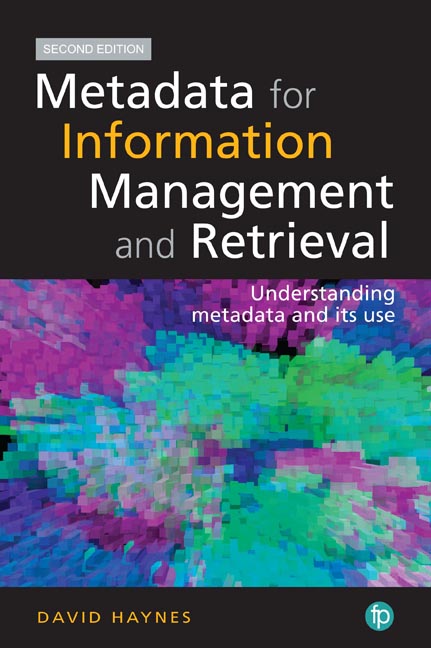Book contents
- Frontmatter
- Contents
- List of figures and tables
- Preface
- Acknowledgements
- PART I METADATA CONCEPTS
- PART II PURPOSES OF METADATA
- 5 Resource identification and description (Purpose 1)
- 6 Retrieving information (Purpose 2)
- 7 Managing information resources (Purpose 3)
- 8 Managing intellectual property rights (Purpose 4)
- 9 Supporting e-commerce and e-government (Purpose 5)
- 10 Information governance (Purpose 6)
- PART III MANAGING METADATA
- References
- Index
10 - Information governance (Purpose 6)
from PART II - PURPOSES OF METADATA
Published online by Cambridge University Press: 08 June 2018
- Frontmatter
- Contents
- List of figures and tables
- Preface
- Acknowledgements
- PART I METADATA CONCEPTS
- PART II PURPOSES OF METADATA
- 5 Resource identification and description (Purpose 1)
- 6 Retrieving information (Purpose 2)
- 7 Managing information resources (Purpose 3)
- 8 Managing intellectual property rights (Purpose 4)
- 9 Supporting e-commerce and e-government (Purpose 5)
- 10 Information governance (Purpose 6)
- PART III MANAGING METADATA
- References
- Index
Summary
Overview
This chapter considers the ways in which metadata has an impact on information governance. The first part of the chapter considers the role of metadata in privacy, freedom of information and legal admissibility of documents. It then goes on to explore the use of metadata to facilitate regulatory compliance. This demonstrates approaches to document and information management and to metadata policies which contribute to the overall ability of organisations to comply with regulatory requirements.
Governance and risk
Information governance is a major preoccupation for many organisations. Not only is there legislative pressure from freedom of information and privacy legislation around the world, but there is also a concern about managing risk. Data loss, malicious access, poor data quality and lack of interoperability can all have a profound effect on the viability of a business or integrity of a public service. Reports in the press of data breaches have led to loss of reputation which can have a real effect on sales. Security breaches can also lead to direct financial loss as well as lost opportunities and exposure to further threats.
As well as the generic risks, many corporations operate in regulated sectors or markets and have to be able to demonstrate compliance. There are increasing global pressures for multinational enterprises to comply with national legislation in the markets in which they operate. National governments and international bodies are co-operating to ensure that regulations are applied across the board and that potential loopholes are closed off.
Responses to these pressures by professional bodies such as computing, information management, document and records management and library and information services have resulted in new approaches and practices. These professional bodies also play an important role in setting standards and providing training for professionals responsible for compliance. This chapter identifies these areas and looks at ways in which metadata has been used as a part of information governance. It could be argued that metadata is an information resource that itself is subject to governance and this is discussed in Chapter 11.
- Type
- Chapter
- Information
- Metadata for Information Management and RetrievalUnderstanding metadata and its use, pp. 151 - 160Publisher: FacetPrint publication year: 2018



